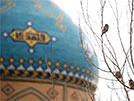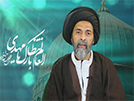Chapter 10-Beyond Resignation to Destiny
- Details
- Hits: 4634
Chapter 10
Beyond Resignation to Destiny
--------------------------------------------------------------------------------
Beyond Resigning to Destinty: Reliance on Allah, Submission to Him, Total Surrender to His Will
Be informed that unless one looks into these venues and takes his share of them, he shall never taste the sweetness of conviction, even if such believer already has in them degrees and stations [reserved for him] according to the degree of his nearness to Allah.
Allah, the most Exalted and the most Great, has said,
‘Allah will raise to (suitable) ranks (and degrees) those of you who believe and who have been granted knowledge.’ (Qur’an, 58:11).
A poet did well when he said,
Lord! A group wept out of fear of You,
Yet those who wept had no sin of their own,
But in order to seek nearness to You,
They weep hoping for such nearness.
Conviction (iman) is a higher degree than belief (Islam) when you compare such stations. The Arab bedouins lied when they claimed to have attained iman as we are told by the Almighty in this verse:
‘The desert Arabs say, ‘We believe.’ Say: ‘You have not (yet fully) believed; therefore, you should only say, ‘We have submitted our wills to Allah,’ for faith has not yet entered your hearts. But if you obey Allah and His Prophet, He will not diminish any of your deeds, for Allah is oft-Forgiving, Most Merciful.’
What an embarrassment! What a scandal will afflict those who will lie on that Day, claiming to have iman, calling themselves mu’mins, deceiving only their own selves when making such a claim! They ought to repeat what another poet has said:
Your nafs deceived you;
Not among those who truly love Him are you,
For those who are in love have many a mark and a clue.
We also ought to pay notice to one who says,
If you love certain people, walk on their path,
None reached there except those who severed ties except theirs.
We should also listen to the verse of the Almighty wherein He says,
‘Put your trust in Allah if you have faith.’ (Qur’an, 5:26)
and also this:
‘No, by your Lord! They can have no (real) faith until they make you judge in all disputes between them and find in their souls no resistance to your decisions, but accept them [such decisions] with the fullest conviction.’ (Qur’an, 4:65).
If iman is achieved when one relies on Allah and surrenders to His will, realizing their full implications, one must also exert his effort in strengthening anything upon which iman relies and upon whose axis it revolves. Such is the great emphasis in the sacred Book and in the sacred Sunnah for the believers: they should have a sound conviction and uphold all its requirements which we have enumerated. The most Exalted and the most Great One says, ‘O believers (in the Islamic faith), believe...,’ that is, attain your fair share of conviction so that your conduct must be up to par with it, so that you may enjoy its fruits. Those implied in this Divine call have already attained the minimum requirement of conviction, hence they are not urged to attain it. As for others, it is something extra, perhaps a luxury, and it is not defined.
There is a great deal of emphasis on the arranged order of the middle station, that is, the average individual who feels he surely believes, responding to the Divine Commandments and anything less than that. Anything higher than that is undoubtedly closer to one’s perfection of conviction. This middle station is known to be one of the requirements. Anything less than it is not to have the same label. One must aspire to what is always higher and better. If you contemplate on this statement, you will not hesitate to roll your sleeves and exert your effort and determination to attain the handsome amount of conviction to the extent that you will be worthy of being identified with it. Such has been the advice of Imam al-Sadiq (‘a) as narrated in Al-Kafi which cites the Imam as saying,
‘You cannot be righteous till you acquire knowledge. You cannot acquire knowledge unless you are truthful. You cannot be truthful unless you believe. These are four chapters the first of which cannot be sound without its precedent. Those who uphold only three of them stray from the right path a great deal.’ (Al-Kafi, Vol. 2, p. 39).
Also, the Commander of the Faithful (‘a), as we are told in Al-Kafi, is quoted by Imam al-Sadiq (‘a) who cites his forefathers (‘a) quoting the Commander of the Faithful (‘a) saying,
‘Conviction (iman) stands on four corners: reliance on Allah, surrender to His will, acceptance of His destiny, and yielding to the Commandment of Allah, the most Exalted, the most Great.’ ( Al-Kafi, Vol. 2, p. 47).
Also, this has been explained and clarified by our master Musa ibn Ja`far (‘a) as quoted in Tuhaf al-`Uqul when he said,
‘Anyone who is granted by Allah the power for reasoning ought not accuse Him of being slow in providing him with sustenance, nor should he accuse Him with regard to His decrees.’
He (‘a) was asked about sure conviction (yaqin). He said,
‘It is when one relies on Allah, surrenders to Allah, accepts Allah’s decrees and entrusts his affairs to Allah.’ (Tuhaf al-`Uqul, p. 408).
The Messenger of Allah (‘a), too, attracted our attention to the conditions and attributes required for iman and what is lacking in one in order to reach the status of becoming a wali of Allah. Al-Kafi cites Imam al-Sadiq (‘a) quoting his grandfather the Messenger of Allah (‘a) as saying,
‘One who knows Allah and deems Him Great stops his tongue from speaking, his stomach from food and concerns himself with fasting and praying.’
People said to him,
‘O Messenger of Allah! May you be sacrificed with our parents, are such people really the walis of Allah (‘a)?!’
He (‘a) said,
‘The walis of Allah remained silent, hence their silence was [an indication of] their remembrance of Allah. They cast a look, hence what they saw was a source of admonishment for them. They spoke, hence their speech was wisdom. And they walked, hence their walking among the people was a blessing (to those people). Had it not been for the life-terms pre-assigned for them, their souls would not have settled in their bodies out of their fear of the torment and out of eagerness for the rewards.’ (Al-Kafi, Vol. 2, p. 186).
So has our master Imam Ali son of Imam al-Husain (‘a) who attracted our attention to what belief and knowledge of the Almighty require, characteristics whereby a believer and his knowledge of the Almighty are gauged, saying, according to p. 317 of al-Tibrisi’s book Al-Ihtijaj (with a variation of wording), by way of poetic verses thus:
Whoever knows Allah, but such knowledge
Does not avail him, is surely a wretch,
What would one do with the rich man’s prestige
While all prestige belongs to the righteous man?
What harm can touch a man of obedience
So long as he obeys Allah?
The basis of all good things, the axis upon which all matters revolve in as far as these requirements are concerned, is that one must continuously watch his conduct under all circumstances lest he should disobey Allah. He [Allah] must never be out of your sight, for you are never out of His. [52] And it is implied in the following statement by the Prophet (‘s) to Abu Tharr:
‘Worship Allah as though you see Him, for if you do not see Him, He sees you.’ (al-Tusi’s, Amali).
According to another hadith, the Prophet (‘s) said,
‘If you see that He seeks you, yet you still disobey Him, you would then be holding Him with the least regards.’
So, if you keep being mindful of Allah, abandoning the entanglements which distract you from directing your full attention to Allah, you will surely then witness His kindness, how He looks after you, how He is kind to you, how He overlooks your faults, hides them from others, replaces your faults with merits, rewards your sins with many times their number in good deeds..., your love for Him will then be firmly established in your heart. Your senses will willingly obey Him just as anyone obeys those who are benevolent to him. The hearts are bent on loving those who are benevolent to them; so, what would you say about this great Benevolent One, the most Affectionate, the most Merciful?!
It is because of the above reason that your soul shuns the doing of anything with which He is displeased. It feels too shy to reward benevolence with wrongdoing, or on account of feeling in awe of Him when His Greatness takes control of your heart, or out of fear of His signs being cut off from you. It is similar to what the poet implies when he says the following:
When enjoying a blessing, you should look after it,
For acts of disobedience remove the blessings.
The same it is when He looks unto you; from your vision, everyone else besides Him diminishes; so you see none who helps or harms besides Allah, Glory and Exaltation to Him. Anyone else besides Him does whatever he does only with His permission. When hearts turn away from Allah Almighty, they cling to these causes because they forget Who causes them; otherwise, when they remember Allah and accept His guidance, they will not consider turning to anyone else, or entirely cling to anyone besides Him. This, as far as the minds are concerned, is instinctive. When one is able to obtain help from the strongest source, how can he still cling to the weakest, nay, to what is nothing compared to Him, especially when, in the latter case, to one who will be deprived of the help of the Most Mighty of all?! A poet once said,
One who seeks help from `Amr, in the time of need, stands
Like one fleeing from fire by seeking refuge with burning sands.
Prophet Ibrahim (Abraham) (‘a) was placed in the catapult and was hurled into the fire when Gabriel (‘a) offered to help him saying, ‘Brother Ibrahim! Do you need any help?.’ ‘Not from you,’ answered Ibrahim. Hence, Allah Almighty caused the fire to be cool and safe to him (Bihar al-Anwar, Vol. 12, p. 33), revealing in his honor the following verse:
‘... and of Abraham who fulfilled his obligations.’ (Qur’an, 53:37).
This happened to prophet Abraham because he turned only to Allah Almighty while being in such a condition. Because of His status, He suffices for all other causes. He dedicated his entire attention to the One Who causes every causation. The mark of his truthfulness is the honesty of his heart, its absence of confusion when all other means were there; actually, whether they were there or not, it would not make any difference. I even heard one of those endowed with knowledge, may Allah elevate his status and raise his standards in both worlds, saying that perhaps he would be disturbed when causes are there, but when they are gone, his heart will be at ease, and he will no longer be disturbed.
These are the highest stations of reliance on Allah and the most truthful. It is as though the reason for the disturbance is the presence of causes: It is the direction of the Divine Command upon noticing the causes. When one notices them but not depends on them, it is quite understandable and normal; so, it is not out of the ordinary when one’s heart is disturbed according to the extent of his assessment of them or of how much he thinks about them. Once they are removed, and the heart directs its attention to one single direction, it will be calm and serene at the mention of Allah; thus has Allah described in His Glorious Book:
‘... Those who believe and whose hearts find rest in the remembrance of Allah; without doubt, hearts do find rest in the remembrance of Allah.’ (Qur’an, 13:28).
Also, a mark of his truthfulness is that his heart is not affected by one who does not respond favorably to Him when He calls upon him [to obey His Commandments]. Rather, one’s condition should be the same like someone who once wrote a ruler requesting him to give him of the sustenance with which Allah entrusted him. He did well when he wrote him as saying, ‘Give me, for Allah is the One Who gives. He has enabled you to be a giver of goodness. But if you withhold it from me, Allah is the One Who withholds, and there is no harm on your part; do not forget your share of the life of this world and be good just as Allah has granted goodness to you.’
A person who looks to the One Who causes the causation, the One Who holds the means of all things, he does not feel angry in their regard. Yes, if one whom Allah enables to be a giver and who does not give, surely does not cease to be a tool in His hand. The true Giver of goodness has fixed with Him the right to reward you, obligating you to thank whoever gives you. Actually, He does not accept your thanking Him except if you thank the person whom He enabled to give you. [53] This is a great principle overlooked by some of our pious brethren. They focused on Allah, so they do not regard His creatures as having one single right obligating benevolence which Allah enables them to undertake. This is a very serious error and a great deal of confusion as well as ignorance of the way of Ahl al-Bayt (‘a). This way [and only this way] is compatible with reality. An example about the way of Ahl al-Bayt (‘a) occurs in Al-Kafi where Imam Ali son of Imam al-Husain (‘a) is quoted as having said,
‘On the Day of Judgment, Allah will ask His servant, ‘Did you thank so-and-so’. He will answer Him by as saying, ‘No, Lord, I thanked You instead.’ Allah will then say, ‘You did not thank Me since you did not thank him.’ The Imam (‘a) went on to say, ‘The most appreciative among you is one who appreciates people the most.’ (Al-Kafi, Vol. 2, p. 81).
This text is quite clear as we have transmitted it.
As for the conflict of this whimsical false charge with the reality, its basis springs out of the commoners as well as those who are stubborn and who say, ‘We thank You, Lord, and we do not recognize any right for these intermediaries.’ Allah rejects their argument and does not accept their thanks except if they thanked those whom He enabled to be good to them. Thus, He made the way to thank Him the recognition of those whom He enabled to be benevolent to others, making these benevolent folks the gate to Him; whoever does not approach Him through the gate will be dismissed and expelled.
The same applies to spiritual knowledge and to means of expressing obedience to Allah. The commoners wanted to approach Allah without the intermediaries: Muhammad (‘s) and his righteous and pure Ahl al-Bayt (‘a). [54] Allah rejected it, conditioning His acceptance on the recognition of His friends, on learning from them, referring to them, paying attention to them. Anything earned through any means other than through them is rejected to its source and will be a problem to the latter.
Denying the favor of benevolent individuals who, from among all people, hold the keys to giving, is a branch of this condemned false charge which has found its way to the hearts of some of our righteous fellows who did not pay attention to their source and to the truth. We have now removed the veil from them so that one may be guarded against falling into its traps, and surely Allah is the One Who is the Protector. I would like in this chapter to quote a wonderful, curing and satisfying tradition on which I stumbled in Tuhaf al-`Uqul by the virtuous al-Hasan ibn Ali ibn Shu`bah, one of our early fellows. Even our mentor al-Mufid (ra) quotes this same book, a book the like of which time has not permitted to be written yet. Here it is:
A man once visited Imam al-Sadiq (‘a). The Imam (‘a) asked him,
‘Who is the man from?’
The man said, ‘One of those who love and are loyal to you [Ahl al-Bayt (‘a)].’
Al-Sadiq (‘a) said,
‘Allah does not love a servant of His unless He takes him for a wali (friend), and once He takes him as His wali, He accepts nothing for him less than Paradise. From among whom of those who love us are you?’
The man kept silent. Sadeer asked the Imam (‘a), ‘How many [types] are those who love you [Ahl al-Bayt (‘a)], O son of the Messener of Allah (‘a)?’ The Imam (‘a) said,
‘They are of three types: one which loves us openly but does not love us secretly; one which loves us secretly but does not love us openly, and one which loves us secretly and openly: These are the ones who are the highest of all. They drank of the purest of drinks, learned how to interpret the Book [of Allah] and the wisdom of speech as well as the causation of every cause; they are the highest rank. Poverty and want as well as various types of afflictions are more swift in reaching them than racing steeds. Trials and tribulations affected them, and they were shaken tremendously; so, some of them were wounded while others were slaughtered. They are dispersed in every distant land. Through them does Allah cure the sick and enrich the destitute. Through them are you to receive victory. Through them do you receive the rain and the sustenance, and they are the least in number and the greatest in esteem and significance with Allah. As for the second class, the lesser one, it includes those who love us publicly and yet do what kings do. Their tongues are with us while their swords are drawn against us. As for the third class, the middle one, it includes those who loved us secretly but did not love us openly. By my life! How I wish they truly loved us secretly rather than openly! Such are those who fast during the day and spend the night in prayers. You can see the mark of asceticism on their faces; they are the people who willingly surrender to their Lord and uphold His Commandments.’
The man said, ‘I am one of those who love you secretly and openly.’ Imam al-Sadiq (‘a) said,
‘Those who love us secretly and openly have marks whereby they are identified.’
The man said, ‘What are these marks?’ The Imam (‘a) said,
‘These are characteristics the first of which is that they know Tawhid as it should be known; they perfect the science of Unifying Him; they then believe in how He is and what His attribute is. Then they come to know the definitions of iman, the facts about it, its conditions and interpretations.’
Sadeer said, ‘O son of the Messenger of Allah! I never heard you before describing iman like that!’ The Imam (‘a) said,
‘Yes, O Sadeer! An inquirer ought not ask about iman before first knowing in whom he has to believe.’
Sadeer said, ‘O Son of the Messenger of Allah! Could you please explain what you have just said?’ Imam al-Sadiq (‘a) said,
‘Anyone who claims he knows Allah by what his heart tells him is mushrik. Anyone who claims he knows Allah by name without knowing exactly what the name means admits that he has cast doubt about Him because a name is created. One who claims he worships the name and the meaning attributes a partner to Allah. One who claims that he worships the attribute not with his true realization refers to someone who is not there. One who claims that he worships the attribute and the One to Whom it is attributed violates the principle of Tawhid because the attribute is something while the One to Whom it is attributed is someone else. One who claims he adds the One described to His description minimizes a Grand One: ‘They underestimate Allah...’ (Qur’an, 6:91).’
It was said to him, ‘Then what is the path to Tawhid?’ He (‘a) said,
‘The means of the research are available. Seeking the outcome exists. One can know what he sees prior to someone else describing it for him. One can get to know the description of someone absent before seeing him in person.’
It was said to him, ‘How can we get to know what we witness prior to being informed of one’s attribute?’ He (‘a) said,
‘You get to know Him; you get to know about His knowledge and identify yourself through Him. You cannot identify yourself by yourself on your own. You will know that what is in Him is His and is through Him just as they said to Yousuf: ‘Are you indeed Yousuf?’ He said, ‘I am Yousuf, and this is my brother.’ (Qur’an, 12:90). So they identified him [Yousuf] by his own person, not by [comparing him with] some other person, nor did they become convinced that it was he simply because their hearts suggested so to them. Have you not noticed how Allah says, ‘It is not in your power to cause the growth of its trees.’ (Qur’an, 27:60)? He means: You do not have the option to install an Imam by your own selves then call him righteous through your own whims and self-wills.’
Then Imam al-Sadiq (‘a) added saying,
‘Three persons to whom Allah shall not speak on the Day of Judgment, nor will He look upon them, nor will He purify them, and they shall receive a painful torment: One who plants a tree which was not planted by Allah (i.e. one who installs an Imam who was not appointed by Allah), one who denies the authority of someone appointed by Allah, and one who claims that both these persons have a share in Islam although Allah has already said, ‘Your Lord creates and chooses as He pleases: They have no choice (in the matter).’ (Qur’an, 28:68).
As for the description of iman, the Imam (‘a) said,
‘The meaning of the attribute iman is: admission of and submission to Allah through the humility of thus admitting, seeking nearness to Him through His help, carrying out the responsibility towards Him with regard to anything small or big, starting from Tawhid and ending with anything less, up to the last venue of obedience to Him, one after the other. All this is inter-connected one to another, each linked to the other.’
So, if a servant of Allah performs what Allah has obligated him to perform, the knowledge of which having reached him as we have described above, then he is a believer (mu’min) worthy of the attribute of iman, deserving to be rewarded. The meaning of iman as a whole implies admission of acceptance to be wholly obedient of every commandment, small or big, each linked to the other; thus, a believer does not get out of the cycle of iman except when he abandons the doing of that in which he himself believed. He earned and became worthy of being called a mu’min after having carried out his major obligations, each linked to the other, avoiding and abandoning the committing of major sins. If he abandons minor acts of obedience, committing minor acts of disobedience, he does not get out of the cycle of iman, nor is he regarded as having abandoned it unless he abandons the performing of major acts of obedience and does not commit any major act of disobedience. As long as he has not done so, he is a believer on account of this verse:
‘If you (only) avoid the most heinous of the things which you are forbidden, We will drive out all the evil in you and admit you into a gate of great honor.’ (Qur’an, 4:31),
referring to His forgiveness of what is less than a major sin. If one commits a major sin, he will be held accountable for having committed all other sins, small and big, and he will be tormented because of them, as we are told on p. 325 of Tuhaf al-`Uqul.
This concludes what we liked to cite. The text continues; those who wish to refer to it may do so. It includes categorizing love for Ahl al-Bayt (‘a), an attribute which is the mark of iman and from which iman diversifies. This, indeed, is a tradition like no other.
Such knowledge is not incorporated in one single tradition, although traditions put together will convey the gist of this sacred tradition.
Such are the traditions of Ahl al-Bayt (‘a): each one of them explains the other. None of them contradicts the other. One may see ‘differences’ in them when he is ignorant of the areas which preceded their explanations. Each one of them aspires to explain one of such areas. It is used to point to another by way of reference and allusion so that each person will attain his share thereof:
‘Each group [of people] now know their own watering place. So eat and drink of the sustenance provided by Allah and do no evil nor mischief on earth.’ (Qur’an, 2:60).
Notes:
[52]. What the author states here is the result of what is recorded in the books of ethical codes. It is the pith arrived at by those from among the walis of Allah Almighty who seek it. Such vigilance is the result of the primary struggle [against one’s own whims and desires], and it by itself is a prerequisite for a much greater vigilance which absorbs all the affairs of the life of the worshipper who is not being watched. It is like one who sows a seed here and a seed there, in a fertile soil and in a salty one, without personally or through the help of someone else looking after it by irrigating and cultivating it. Had he surrounded such a seed with his care and attention, it would have shaken, set root and produced of every pleasing pair of vegetation.
[53]. There is a reference here to the state of extravagance with which those who do not minutely know are afflicted. Examples of such extravagance are those who take to the path without being fully knowledgeable of its basics, without consulting those who are familiar with it, as they do something. Hence, not only did they fail to reach their destination, they wronged those who were truthful in seeking the path, accusing them of wearing an outfit which does not suit them! Observing the rights of people is inseparable from observing the rights of the Creator. He is the One Who ordered that we should observe all rights, whether related to Him or to His servants from among His creation.
[54]. This is a beautiful turn taken by the author regarding the necessity of observing the rights of all people and the obligation to thank the benevolent ones from among them, turning to address the necessity of observing the rights of all people especially the rights of those who represent the highest manifestations of adoration in existence. At the conclusion of his work, the compiler seals it with a musk seal, connecting the path to Allah Almighty to the detailed connection with those who lead to Him. Here, there is no end to one’s bewilderment with regard to those who sought to reach out to Allah Almighty without going through the gate which He ordered them to knock at. The Prophet (‘s) enjoined people to uphold them as next only to the Book of his Lord. One who abandons them actually abandons the means of salvation when one seeks refuge with both handles. If one contends himself with holding only to one of them, it will not be sufficient for his salvation. This is why anyone who abandons their way will never reach the degree of perfection even if he makes such a claim when he publicizes for it or expresses his passion in his poetry. Reaching to Allah Almighty is not attained by making claims or by following whims.











